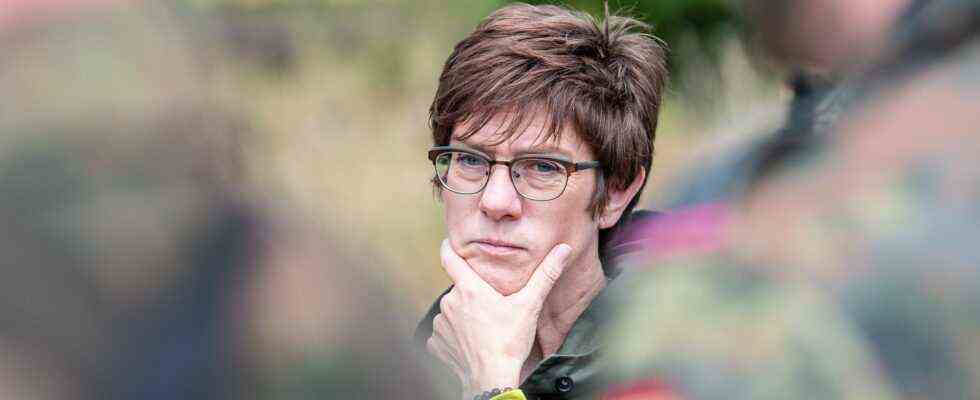analysis
Status: December 15, 2021 1:44 p.m.
Whether the basic program of the CDU or reform of the Bundeswehr – Annegret Kramp-Karrenbauer fearlessly tackled large projects during her time in Berlin. But she often ran out of luck.
Actually, Annegret Kramp-Karrenbauer came to Berlin from Saarland to inherit Angela Merkel as Federal Chancellor and CDU chairwoman and to shape the post-Merkel era. Now the Chancellor is Olaf Scholz – and Kramp-Karrenbauer is bid farewell to her last political office for the time being: that of Defense Minister, which she has to surrender after around two years after she was appointed to Brussels by Ursula von der Leyen had subsequently taken over. And three men are currently applying for the CDU chairmanship.
That sounds like an unfortunate political end for the ex-prime minister of Saarland, who once defeated Friedrich Merz in the first race for party leadership after Merkel’s withdrawal in 2019. An experienced, ambitious CDU politician, of whom the party has too little rather than too many, is now resigning almost at the same time as Merkel – this is certainly not how Kramp-Karrenbauer had imagined it: When she decided to leave her Saarland state government in 2018 In order to initially join the Federal CDU as General Secretary, all doors seem to be open to the successful Prime Minister in Berlin – including those of the Chancellery. And that is what she had in mind when she moved to Berlin.
The door to the Chancellery seemed open
A biography about “perhaps the next German Chancellor” appeared promptly. As general secretary, Kramp-Karrenbauer ventilated and initiated a more direct dialogue with party members. It started political debates, and its main goal was a contemporary, new policy program.
Then what happened that, from today’s perspective, might break the political neck of Kramp-Karrenbauer: Merkel surprisingly withdrew after the botched Hesse election – but only halfway. She gave up the party chairmanship, but wanted to bring the legislature as Chancellor to an end – and that against their own assessment that the Chancellery and party leadership at the CDU belong in one hand.
Actually elected against some prophecies of doom
Even if Kramp-Karrenbauer announced on the same day that he would stand and was then actually elected as the new chairman at the Hamburg party conference in 2018 against competitor Merz: From that moment on, she seemed to be out of luck. The party remained split into a camp that was dissatisfied with Merkel and longing for the defeated Merz, which Kramp-Karrenbauer was too unconservative and economically inclined. For the progressive-liberal Merkelians in the party, it was not always liberal enough.
After Angela Merkel’s withdrawal from the CDU party leadership, her successor Annegret Kramp-Karrenbauer – here at the tattoo for the Chancellor on December 2 – would have wished for more support from the Chancellor at times.
Image: dpa
In addition, there were his own mistakes, which caused astonishment in political Berlin. She was blamed for the poor result of the 2019 European elections. It is also true, however, that the European Merkel largely stayed out of the election campaign.
Loyalty looks different
There was also no lack of internal party opponents Kramp-Karrenbauer. When she wanted to retrieve an unsuccessful statement via Twitter after the European elections, Armin Laschet, the then North Rhine-Westphalian state chief, stepped in – also with ambitions for a later candidate for chancellor: loyalty looks different.
In the logic of the politician Kramp-Karrenbauer, who, like Merkel, considered the party chairmanship and the chancellery to belong together, it was logical to announce the renouncement of the candidacy for chancellor and also the withdrawal from the party chairmanship in February 2020. She justified it with the inner turmoil of the CDU – it was not only about the line against the AfD, but also about her person: Deputies like Laschet preferred to remain silent than to support them.
In this respect, the political story of Annegret Kramp-Karrenbauer is also that of an intrepid person who was not afraid of taking risks. And was ready to draw conclusions – be it turning away from one’s own plans or stepping back. For her there was no question of continuing to serve as chairman of a party – some of which fell back on her in the form of powerful opponents. Especially not if they wanted to negotiate the candidacy for chancellor among themselves.
As a minister, as if liberated
In the meantime, she had been appointed Minister of Defense by the Chancellor from 2019 – there, according to political observers, she seemed almost liberated when she relinquished the CDU chairmanship at the end of 2020. And here, too, she hung herself in, ventilated – such as with the Special Forces Command (KSK) or the Military Counter-Intelligence Service (MAD). She came to the group as a down-to-earth listener. She was also fully absorbed in this office – and would have continued if the Union had participated in the government.
Miracle point Afghanistan
For Kramp-Karrenbauer, a sore point of her last political station will probably be the partially unsuccessful evacuation of the Afghan local armed forces. According to her own account, she could not prevail against the participating ministries of Horst Seehofer (CSU), Heiko Maas (SPD) and Gerd Müller (CSU) to tackle the evacuation in good time.
What remains in the story of Kramp-Karrenbauer: fearlessness is obviously not enough. It always needs political supporters. It seems as if Kramp-Karrenbauer fought too often very alone in her four years in Berlin. Or have to fight.

